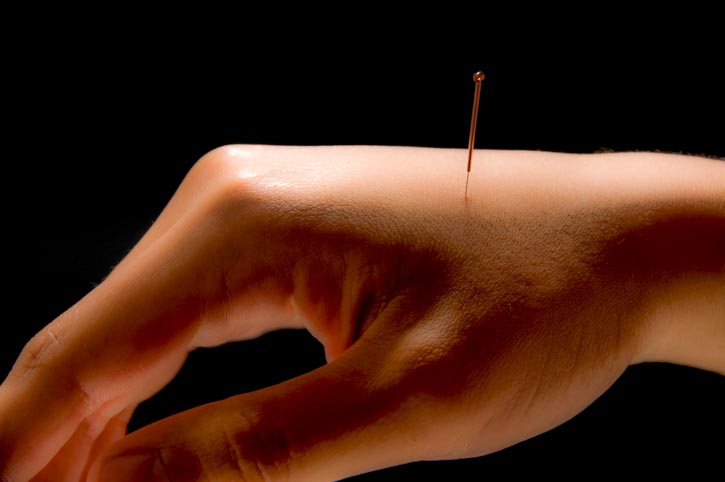Acupuncture outperforms drugs for the depression total cure rate with no serious adverse effects.
Researchers from Jinan University (Guangzhou, China) conclude that acupuncture is effective for the alleviation of depression. In the study, the acupuncture treatment group achieved a total efficacy rate of 88.9% and the drug control group achieved an efficacy rate of 84.8%. Patients in the control group received administration of the pharmaceutical medication fluoxetine (known by the trade name Prozac®). The researchers conclude that acupuncture slightly outperforms fluoxetine for the treatment of depression. In addition, acupuncture treatment displays certain advantages compared with anti-depressant drugs. Acupuncture achieved a higher cure rate and the drugs had a significant adverse reaction rate.

Depression is a common mental disorder wherein patients experience prolonged melancholy. In serious cases, depression might lead to suicidal thoughts and behaviors, flattening of emotions, weakening willpower and physical pathologies. Globally, depression is responsible for a serious impact on patients’ work performance and quality of lives. Hence, finding the most effective treatment has become a matter of utmost urgency to medical researchers around the world. Acupuncture has an ancient and well documented history for the treatment of mental illness. The study focuses on a scientific comparison between drug therapy and acupuncture therapy.
The study involved the selection of 72 patients who received acupuncture or drug treatments at the Acupuncture and Psychology department of the First Affiliated Hospital of Jinan University. Patients were randomly assigned to a drug control group and an acupuncture treatment group. The treatment group was comprised of 17 males and 19 females, with an average age of 29 years and a depression medical history of 20 months; the control group had 20 males and 16 females, with an average age of 28 years and a depression medical history of 21 months.
The patients from both groups were comparable as there were no significant differences in terms of their gender, age and medical histories. It is important to take note that pregnant women, breast feeding mothers, and patients who recently underwent surgery were not included in the experiment. The patients fulfilling at least 4 criteria as stated below were selected for the study:
- Prolonged melancholy (Loss of interest and happiness, Attenuated energy, Slow reactions, Low self-esteem and feeling guilty, Difficulties with imagination and critical thinking, Recurrent suicidal thoughts and behaviors, Sleeping difficulties such as insomnia, waking up too early and sleeping too much, Decreased appetite, Decreased sexual desires)
- Socialization dysfunction
- Symptoms listed above for at least 2 week duration
Patients from the treatment group received acupuncture at the following primary acupoints:
- Neiguan (PC6)
- Shenmen (HT7)
- Yifeng (TB17)
- Baihui (DU20)
- Si Shen Cong
- Si Guan (LI4, LV3)
Additional secondary acupoints were added based on symptom presentation:
- Yang deficiency: Qihai (CV6) and Guanyuan (CV4) acupoints with reinforcing technique
- Liver stagnation: Qimen (LV14), Hegu (LI4) and Taichong (LV3) acupoints with reducing technique
- Phlegm stasis and Qi stagnation: Fenglong (ST40) and Danzhong (CV17) acupoints with reducing technique
Upon disinfection, 0.35 mm x 25 mm or 0.35 mm x 40 mm acupuncture needles were vertically inserted into Neiguan and Shenmen acupoints, up to a 15 mm depth. Next, the Baihui and Si Shen Cong acupoints were targeted where needles were penetrated quickly with the rotational techniques, going as deep as 15 mm. Each treatment course consisted of 10 acupuncture treatments followed by a 5 day break before the next course began. All patients received 4 treatment courses in total.
Patients from the control group consumed fluoxetine hydrochloride tablets, once a day (one tablet per each time, after breakfast). Fluoxetine is a selective serotonin reuptake inhibitor (SSRI) medication. It is used for patients with depression, panic attacks, eating disorders, stress and anxiety, and other conditions including obsessive-compulsive disorders. Every 10 days of tablet consumption consisted of one treatment course. A total of 4 courses were administered, with 5 days of break time between courses. During their courses of treatment, all patients received counseling by doctors in order to rebuild their confidence. They were not allowed to consume any other medications during the study.
After 4 courses of care, the acupuncture treatment group achieved an efficacy rate of 88.9%. A total of 21 patients were cured, 11 showed significant improvements and 4 patients remained uncured. The control group achieved an efficacy rate of 84.8%. A total of 9 patients were cured, 20 showed significant improvements and 7 remained uncured. The efficacy rates show significant differences between these treatment methods.
The drug treatment regimen achieved significant results but with difficulties associated with adverse effects. Compliance issues for pill consumption are compounded by withdrawal symptoms associated with non-compliance with medication schedules. The acupuncture treatments did not have any serious adverse effects. In addition, the total efficacy rate and the cure rate were higher in the acupuncture group. The results demonstrate that acupuncture is an important treatment option for patients with depression.
The successful clinical patient outcomes documented in the study point to the need for further investigations. Large scale studies across multiple centers will be able to evaluate cost-effectiveness, confirm the existing findings, and investigate combined drug and acupuncture therapies. A greater focus on the role of acupuncture for the treatment of mental illness in standard care settings has the potential to increase positive patient outcomes. Moreover, acupuncture has the potential to address physical ailments while simultaneously addressing depression.
Reference:
Wei Bo, Xu Yi, Clinical observations on acupuncture treatment for depression, Journal of Jinan University (Natural Science & Medicine Edition), 2013, 34(6).


